Unit 2 My week PB 课件
文档属性
| 名称 | Unit 2 My week PB 课件 | 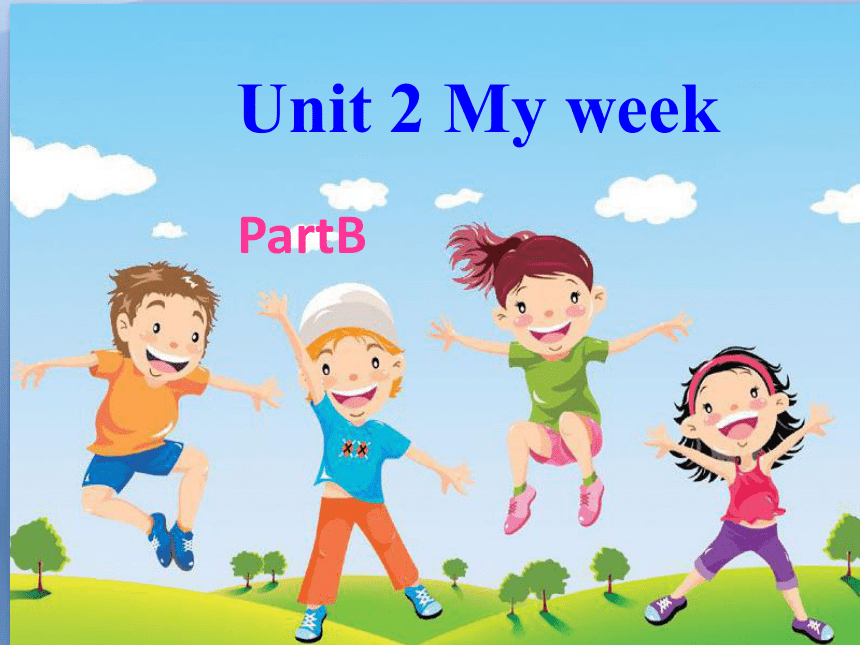 | |
| 格式 | zip | ||
| 文件大小 | 16.5MB | ||
| 资源类型 | 教案 | ||
| 版本资源 | 人教版(PEP) | ||
| 科目 | 英语 | ||
| 更新时间 | 2018-09-07 15:38:52 | ||
图片预览

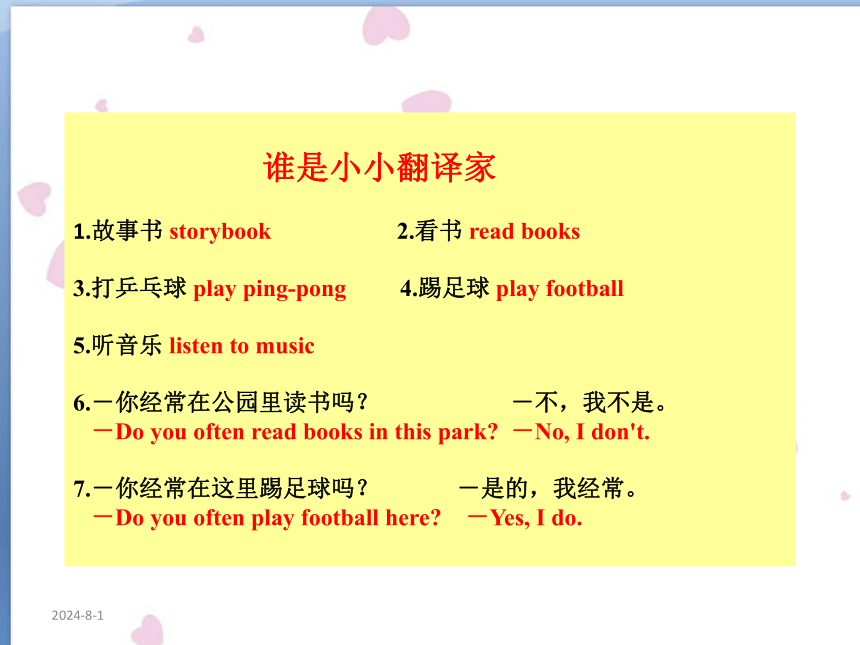
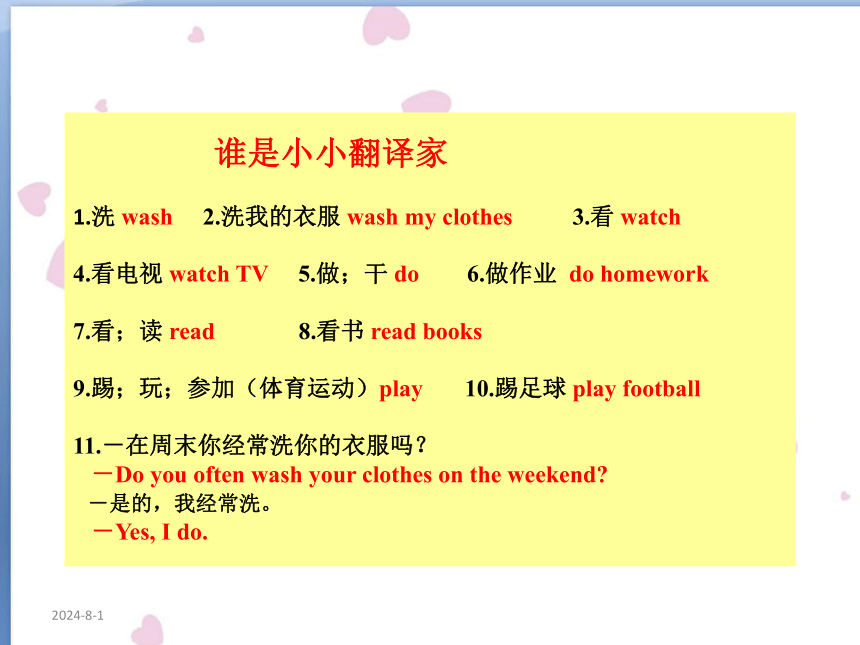
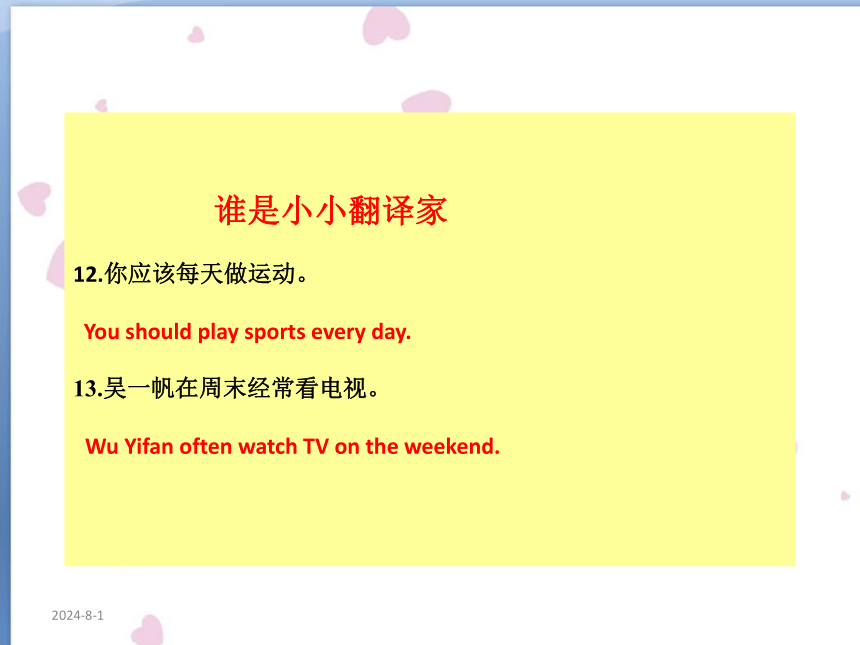
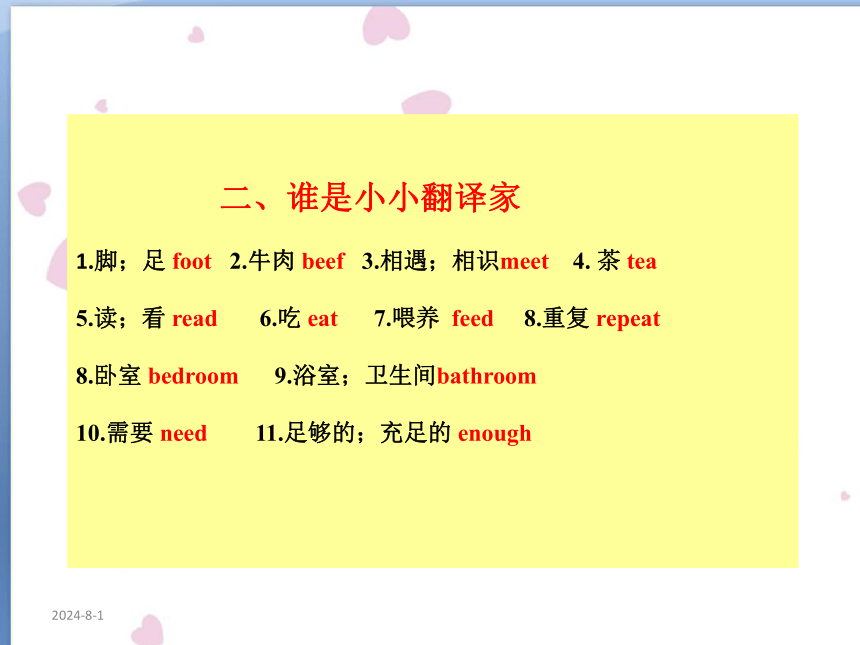
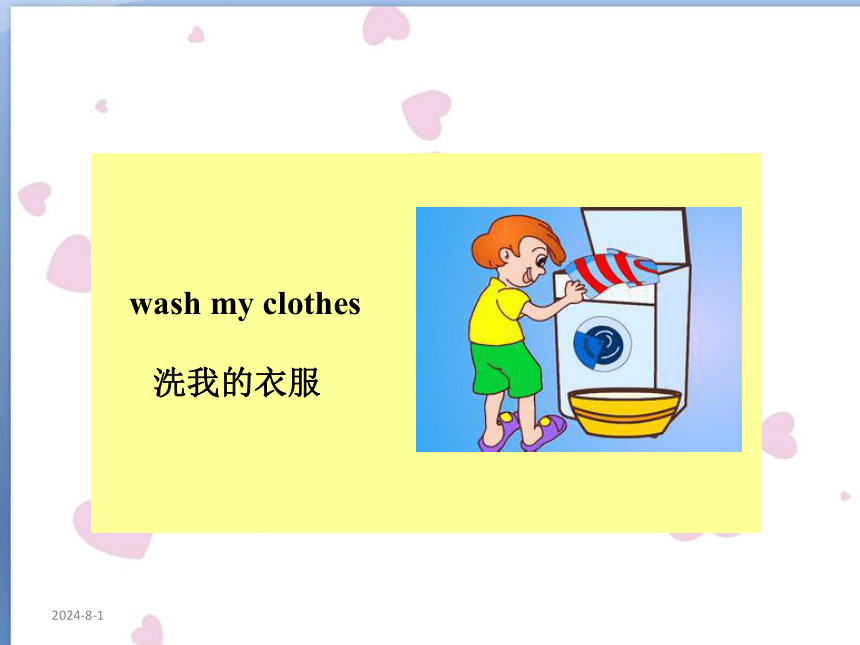
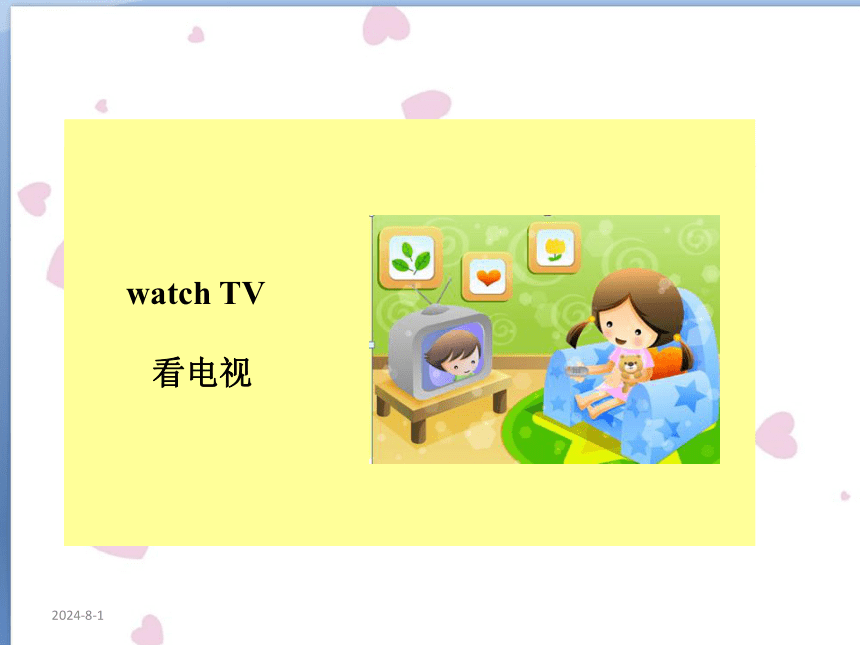
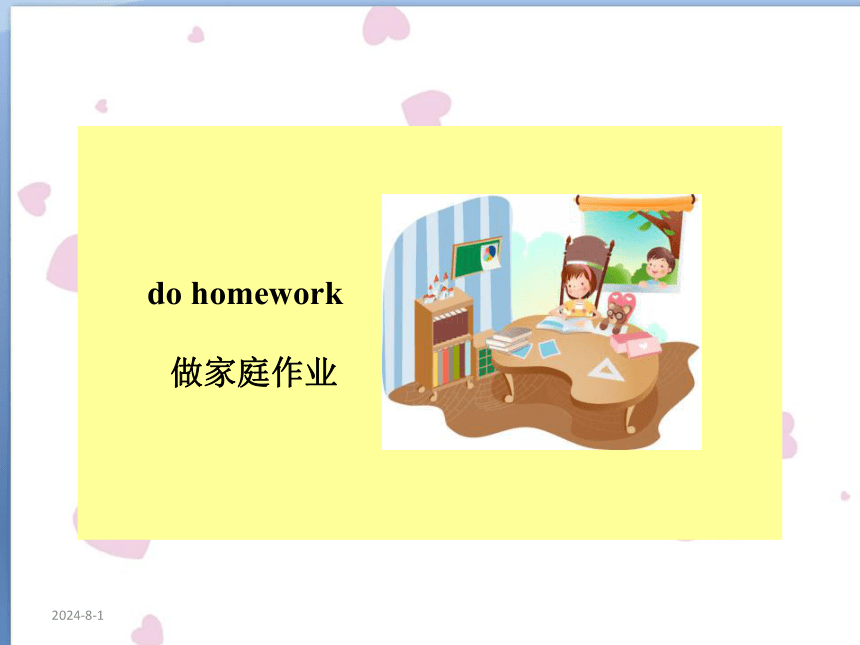
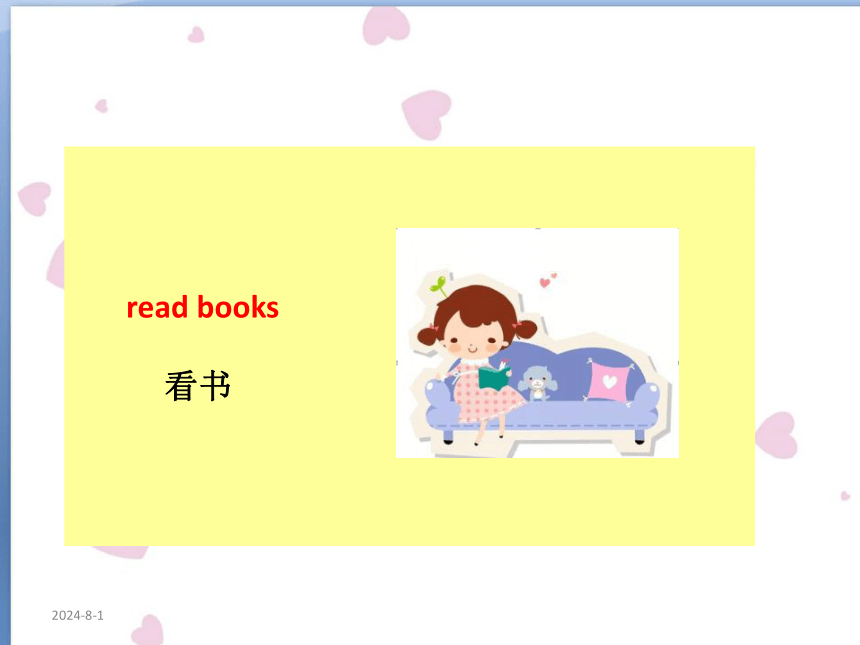
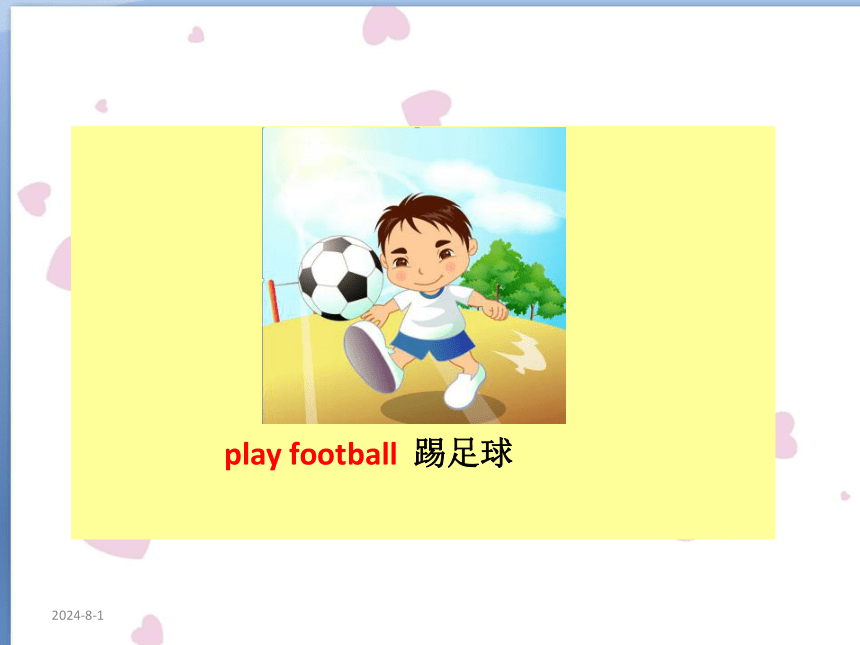
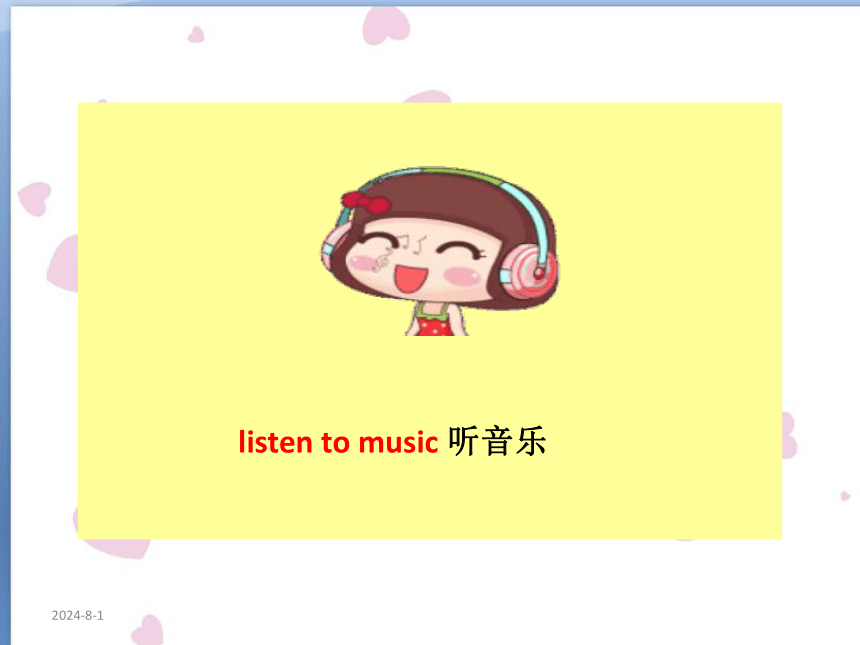
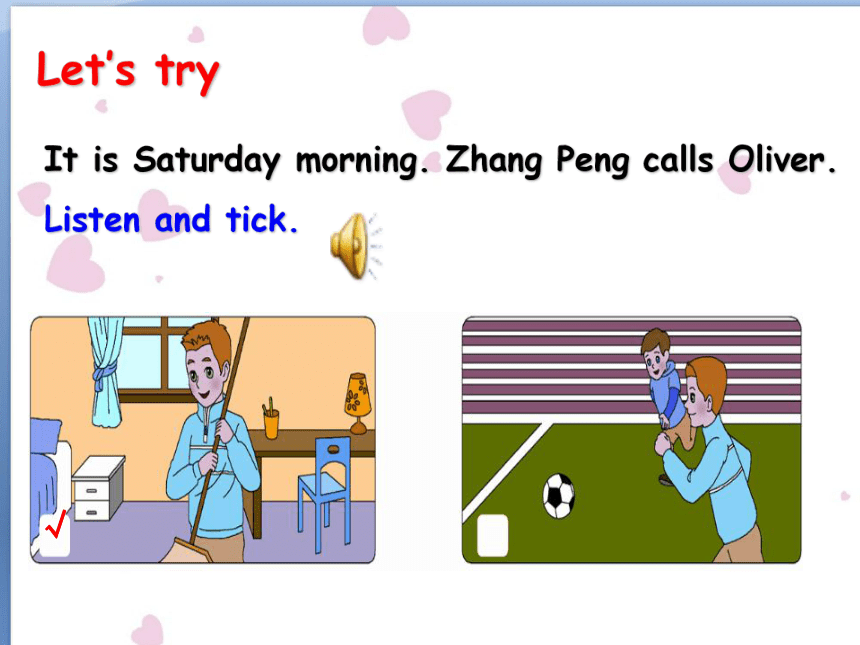
文档简介
课件49张PPT。Unit 2 My weekPartB2018-9-25 谁是小小翻译家
1.故事书 storybook 2.看书 read books
3.打乒乓球 play ping-pong 4.踢足球 play football
5.听音乐 listen to music
6.-你经常在公园里读书吗? -不,我不是。
-Do you often read books in this park? -No, I don't.
7.-你经常在这里踢足球吗? -是的,我经常。
-Do you often play football here? -Yes, I do.2018-9-25 谁是小小翻译家
1.洗 wash 2.洗我的衣服 wash my clothes 3.看 watch
4.看电视 watch TV 5.做;干 do 6.做作业 do homework
7.看;读 read 8.看书 read books
9.踢;玩;参加(体育运动)play 10.踢足球 play football
11.-在周末你经常洗你的衣服吗?
-Do you often wash your clothes on the weekend?
-是的,我经常洗。
-Yes, I do.2018-9-25 谁是小小翻译家
12.你应该每天做运动。
You should play sports every day.
13.吴一帆在周末经常看电视。
Wu Yifan often watch TV on the weekend.
2018-9-25 二、谁是小小翻译家
1.脚;足 foot 2.牛肉 beef 3.相遇;相识meet 4. 茶 tea
5.读;看 read 6.吃 eat 7.喂养 feed 8.重复 repeat
8.卧室 bedroom 9.浴室;卫生间bathroom
10.需要 need 11.足够的;充足的 enough
2018-9-25 polite
有礼貌的;客气的 wash my clothes
洗我的衣服 wash my clothes
洗我的衣服 2018-9-25 hard-working
工作努力的;辛勤的 watch TV
看电视 watch TV
看电视2018-9-25 helpful
有用的;愿意帮忙的 do homework
做家庭作业 do homework
做家庭作业2018-9-25 read books
看书2018-9-25
play football 踢足球2018-9-25
listen to music 听音乐Let’s tryIt is Saturday morning. Zhang Peng calls Oliver. Listen and tick.√Zhang Peng:Hi, Oliver.This is Zhang Peng.Let's play
football this afternoon.
Oliver:Sorry.I will clean my room this afternoon.
Zhang Peng:Do you often clean your room on Saturdays?
Oliver: Yes, I do.
Zhang Peng:OK, bye then.See you on Monday.
Oliver: Bye.(It’s Saturday afternoon.)
Z:Hi,Sarah. ?
S:It’s a .
Z:Do you read books in this park?
S: No,I don’t. ?
Z:Yes,I do.I like this park very much .
S: .What’s thatoftenDo you often play football herestorybookMe tooLet’s talkZhang Peng—Z Sarah—S(It’s Saturday afternoon.)
Z:Hi, Sarah.What’s that?
S:It’s a storybook.
Z:Do you often read books in this park?
S:No, I don’t.Do you often play football here?
Z:Yes, I do.I like this park very much.
S:Me too.Zhang Peng—Z Sarah—S踢足球故事书句型结构:—Do you often read books in this park? Do you often+动词(短语)原形+其他? 由do 引导的一般疑问句,用于询问对方是否经常做某事。
肯定回答:Yes,I/we do.否定回答:No,I/we don’t.—No,I don’t. (如果主语是第三人称单数,则要将助动词do改为does)play football表示“玩(球类、棋类、牌类等)”时,作宾语的名词前不加任何冠词。
表示“演奏(乐器)”时,乐器前通常要定冠词the。例如:play basketball 打篮球
play chess 下国际象棋play the piano 弹钢琴
play the violin 拉小提琴例如:Do you often…? Ask and answer.Talk with your partner.听音乐踢足球打乒乓球Yes,I do.Do you often play ping-pong
on the weekend?No,I don’t. Do you often listen to music?summaryDo you often play read books/play football/…?
肯定回答:Yes,I/we do.
否定回答:No,I/we don’t.wash my clotheswatch TVplay footballdo homeworkread booksLet’s learnwash my clothesYes,I do. Do you often wash your clothes on the weekend?
look 看,因想看而投注目光,不管结果如何。
I looked but couldn't see it clear.
我看了可是看不清楚。
read 看书,阅读。多指阅读文字性材料,如书、
报、杂志等。
He often read books in the evening.
他经常在晚上看书。区分look,read,see,watchsee 看见,看到。指看到了某人或某物,强调看
的结果,意为“看到……”。
I can see a girl under the tree.
我能看见树下有个女孩。
watch 注视,观看。指集中注意力观看或注视,
常指看电视或比赛。
I often watch the football match.
我经常看足球赛。Group workWhat about you? 你呢?
通常用在自己陈述了一个事实,然后来征求对方的看法或意见。后面可以接名词、代词的宾格形式或动词的ing形式。What about you?可以用How about you? (你呢?)来代替。
【例】
I'm a teacher.What about you?
我是一名老师。你呢?Robin’s adviceRobin: You look tired.What do you have on
Fridays?
Wu Yifan: I have PE. “主语+look+形容词”表示某人看起来怎么样。look是感官系动词,后面加形容词。
主语是物时,此句型还可以表示某物看起来怎么样。如果主语是第三人称单数形式,感官系动词也要变为第三人称单数形式。Read and writeRobin: Do you often play sports?
Wu Yifan: No,I don’t.I don’t like sports.由play构成的短语还有:
play games做游戏 play with和……一起玩play football play basketball play ping-pong do kungfu (功夫)做体育运动 Robin:What do you often do on the weekend?
Wu Yifan:I often watch TV.Sometimes I read
books.often,sometimes是表示频度的副词,表示频度的
副词还有always,usually,never。在句中习惯位于be动词、助动词之后,行为动词之前。1.同于其他频度副词;2.句首;3.句尾。总是通常经常从不有时 I always get up at
7:30.What do you usually
have for dinner?I often read books
in the park.I have never been
to Shanghai.I sometimes go to the
library.这里表示劝告、建议,意思是“应该”,后面必须接动词原形。You should play sports every day.
Here is a new schedule for you.每天every day与everyday的
区别是什么呢?工作计划;日程安排every day与everyday的区别:every day 每天。副词,可用作状语。
You should read books every day.
你应该每天看书。
everyday 每天的。形容词,可用作定语。
The Internet has become part of everyday life.
互联网已成为日常生活的一部分。 R:You look .What do you on Fridays?
W:I have PE.
R:Do you often ?
W:No , I don’t. I don’t like sports.
R:What do you often do on the weekend .
W: .Sometimes I .tiredhaveplay sports I often watch TVread booksRobin—R WuYifan—WLook at the schedule and complete the dialogue. Read and judge(轻声朗读对话,并判断) Tick or cross.(√或×)√××sometimesdoesn’t like Sarah:What do you have on Mondays?
Wu Yifan:I have a football class.
Sarah:What do you have on Tuesdays?
Wu Yifan: .
Sarah: ?
Wu Yifan:I have a basketball class.I have a ping-pong classWhat do you have on WednesdaysLook at the schedule above and complete the dialogue below.2018-9-25
should的用法
① 含义:should是情态动词,意为“应该”,
后面跟动词原形,一起构成谓语。2018-9-25
② 例句:You should play sports every day.
你应该每天做运动。Let’s checkListen and number.2134Let’s wrap it upbedroomWednesdayThursdaybathroomSundayclassroomTuesday你还知道哪些单词可以合成一个新单词呢?2018-9-25
Do you often read books?Yes, I do.分组练习对话2018-9-25
Do you often wash your clothes
on the weekend?Yes, I do.2018-9-25
Do you often______
on the week end? Yes, ______ .Exercise ( ) 1.Does he often listen to music?
A.Yes,he does. B.Yes,he do. C.No,he don’t.
( ) 2.—Do you often play piano?
—Yes,I do.
A. / B. the C. aAB一、选择正确的答案二、连线。找到相应单词的汉语翻译。watch TV
read books
do homework
play football
play computer games做作业
看电视
踢足球
玩电脑游戏
读书2018-9-25三、看图片,选择正确答语。
( B ) 1.Do you often read books?
A.Yes, I do. B. No, I don't.
( A ) 2.Do you often play ping-pong?
A.Yes, we do. B.No, we don't.
2018-9-25炸地雷游戏。
拉火车朗读短语,谁遇到watch TV即为炸弹,谁如果读出watchTV,就被“砰”的一声炸掉淘汰。
游 戏 时 间Thank YOU
1.故事书 storybook 2.看书 read books
3.打乒乓球 play ping-pong 4.踢足球 play football
5.听音乐 listen to music
6.-你经常在公园里读书吗? -不,我不是。
-Do you often read books in this park? -No, I don't.
7.-你经常在这里踢足球吗? -是的,我经常。
-Do you often play football here? -Yes, I do.2018-9-25 谁是小小翻译家
1.洗 wash 2.洗我的衣服 wash my clothes 3.看 watch
4.看电视 watch TV 5.做;干 do 6.做作业 do homework
7.看;读 read 8.看书 read books
9.踢;玩;参加(体育运动)play 10.踢足球 play football
11.-在周末你经常洗你的衣服吗?
-Do you often wash your clothes on the weekend?
-是的,我经常洗。
-Yes, I do.2018-9-25 谁是小小翻译家
12.你应该每天做运动。
You should play sports every day.
13.吴一帆在周末经常看电视。
Wu Yifan often watch TV on the weekend.
2018-9-25 二、谁是小小翻译家
1.脚;足 foot 2.牛肉 beef 3.相遇;相识meet 4. 茶 tea
5.读;看 read 6.吃 eat 7.喂养 feed 8.重复 repeat
8.卧室 bedroom 9.浴室;卫生间bathroom
10.需要 need 11.足够的;充足的 enough
2018-9-25 polite
有礼貌的;客气的 wash my clothes
洗我的衣服 wash my clothes
洗我的衣服 2018-9-25 hard-working
工作努力的;辛勤的 watch TV
看电视 watch TV
看电视2018-9-25 helpful
有用的;愿意帮忙的 do homework
做家庭作业 do homework
做家庭作业2018-9-25 read books
看书2018-9-25
play football 踢足球2018-9-25
listen to music 听音乐Let’s tryIt is Saturday morning. Zhang Peng calls Oliver. Listen and tick.√Zhang Peng:Hi, Oliver.This is Zhang Peng.Let's play
football this afternoon.
Oliver:Sorry.I will clean my room this afternoon.
Zhang Peng:Do you often clean your room on Saturdays?
Oliver: Yes, I do.
Zhang Peng:OK, bye then.See you on Monday.
Oliver: Bye.(It’s Saturday afternoon.)
Z:Hi,Sarah. ?
S:It’s a .
Z:Do you read books in this park?
S: No,I don’t. ?
Z:Yes,I do.I like this park very much .
S: .What’s thatoftenDo you often play football herestorybookMe tooLet’s talkZhang Peng—Z Sarah—S(It’s Saturday afternoon.)
Z:Hi, Sarah.What’s that?
S:It’s a storybook.
Z:Do you often read books in this park?
S:No, I don’t.Do you often play football here?
Z:Yes, I do.I like this park very much.
S:Me too.Zhang Peng—Z Sarah—S踢足球故事书句型结构:—Do you often read books in this park? Do you often+动词(短语)原形+其他? 由do 引导的一般疑问句,用于询问对方是否经常做某事。
肯定回答:Yes,I/we do.否定回答:No,I/we don’t.—No,I don’t. (如果主语是第三人称单数,则要将助动词do改为does)play football表示“玩(球类、棋类、牌类等)”时,作宾语的名词前不加任何冠词。
表示“演奏(乐器)”时,乐器前通常要定冠词the。例如:play basketball 打篮球
play chess 下国际象棋play the piano 弹钢琴
play the violin 拉小提琴例如:Do you often…? Ask and answer.Talk with your partner.听音乐踢足球打乒乓球Yes,I do.Do you often play ping-pong
on the weekend?No,I don’t. Do you often listen to music?summaryDo you often play read books/play football/…?
肯定回答:Yes,I/we do.
否定回答:No,I/we don’t.wash my clotheswatch TVplay footballdo homeworkread booksLet’s learnwash my clothesYes,I do. Do you often wash your clothes on the weekend?
look 看,因想看而投注目光,不管结果如何。
I looked but couldn't see it clear.
我看了可是看不清楚。
read 看书,阅读。多指阅读文字性材料,如书、
报、杂志等。
He often read books in the evening.
他经常在晚上看书。区分look,read,see,watchsee 看见,看到。指看到了某人或某物,强调看
的结果,意为“看到……”。
I can see a girl under the tree.
我能看见树下有个女孩。
watch 注视,观看。指集中注意力观看或注视,
常指看电视或比赛。
I often watch the football match.
我经常看足球赛。Group workWhat about you? 你呢?
通常用在自己陈述了一个事实,然后来征求对方的看法或意见。后面可以接名词、代词的宾格形式或动词的ing形式。What about you?可以用How about you? (你呢?)来代替。
【例】
I'm a teacher.What about you?
我是一名老师。你呢?Robin’s adviceRobin: You look tired.What do you have on
Fridays?
Wu Yifan: I have PE. “主语+look+形容词”表示某人看起来怎么样。look是感官系动词,后面加形容词。
主语是物时,此句型还可以表示某物看起来怎么样。如果主语是第三人称单数形式,感官系动词也要变为第三人称单数形式。Read and writeRobin: Do you often play sports?
Wu Yifan: No,I don’t.I don’t like sports.由play构成的短语还有:
play games做游戏 play with和……一起玩play football play basketball play ping-pong do kungfu (功夫)做体育运动 Robin:What do you often do on the weekend?
Wu Yifan:I often watch TV.Sometimes I read
books.often,sometimes是表示频度的副词,表示频度的
副词还有always,usually,never。在句中习惯位于be动词、助动词之后,行为动词之前。1.同于其他频度副词;2.句首;3.句尾。总是通常经常从不有时 I always get up at
7:30.What do you usually
have for dinner?I often read books
in the park.I have never been
to Shanghai.I sometimes go to the
library.这里表示劝告、建议,意思是“应该”,后面必须接动词原形。You should play sports every day.
Here is a new schedule for you.每天every day与everyday的
区别是什么呢?工作计划;日程安排every day与everyday的区别:every day 每天。副词,可用作状语。
You should read books every day.
你应该每天看书。
everyday 每天的。形容词,可用作定语。
The Internet has become part of everyday life.
互联网已成为日常生活的一部分。 R:You look .What do you on Fridays?
W:I have PE.
R:Do you often ?
W:No , I don’t. I don’t like sports.
R:What do you often do on the weekend .
W: .Sometimes I .tiredhaveplay sports I often watch TVread booksRobin—R WuYifan—WLook at the schedule and complete the dialogue. Read and judge(轻声朗读对话,并判断) Tick or cross.(√或×)√××sometimesdoesn’t like Sarah:What do you have on Mondays?
Wu Yifan:I have a football class.
Sarah:What do you have on Tuesdays?
Wu Yifan: .
Sarah: ?
Wu Yifan:I have a basketball class.I have a ping-pong classWhat do you have on WednesdaysLook at the schedule above and complete the dialogue below.2018-9-25
should的用法
① 含义:should是情态动词,意为“应该”,
后面跟动词原形,一起构成谓语。2018-9-25
② 例句:You should play sports every day.
你应该每天做运动。Let’s checkListen and number.2134Let’s wrap it upbedroomWednesdayThursdaybathroomSundayclassroomTuesday你还知道哪些单词可以合成一个新单词呢?2018-9-25
Do you often read books?Yes, I do.分组练习对话2018-9-25
Do you often wash your clothes
on the weekend?Yes, I do.2018-9-25
Do you often______
on the week end? Yes, ______ .Exercise ( ) 1.Does he often listen to music?
A.Yes,he does. B.Yes,he do. C.No,he don’t.
( ) 2.—Do you often play piano?
—Yes,I do.
A. / B. the C. aAB一、选择正确的答案二、连线。找到相应单词的汉语翻译。watch TV
read books
do homework
play football
play computer games做作业
看电视
踢足球
玩电脑游戏
读书2018-9-25三、看图片,选择正确答语。
( B ) 1.Do you often read books?
A.Yes, I do. B. No, I don't.
( A ) 2.Do you often play ping-pong?
A.Yes, we do. B.No, we don't.
2018-9-25炸地雷游戏。
拉火车朗读短语,谁遇到watch TV即为炸弹,谁如果读出watchTV,就被“砰”的一声炸掉淘汰。
游 戏 时 间Thank YOU
